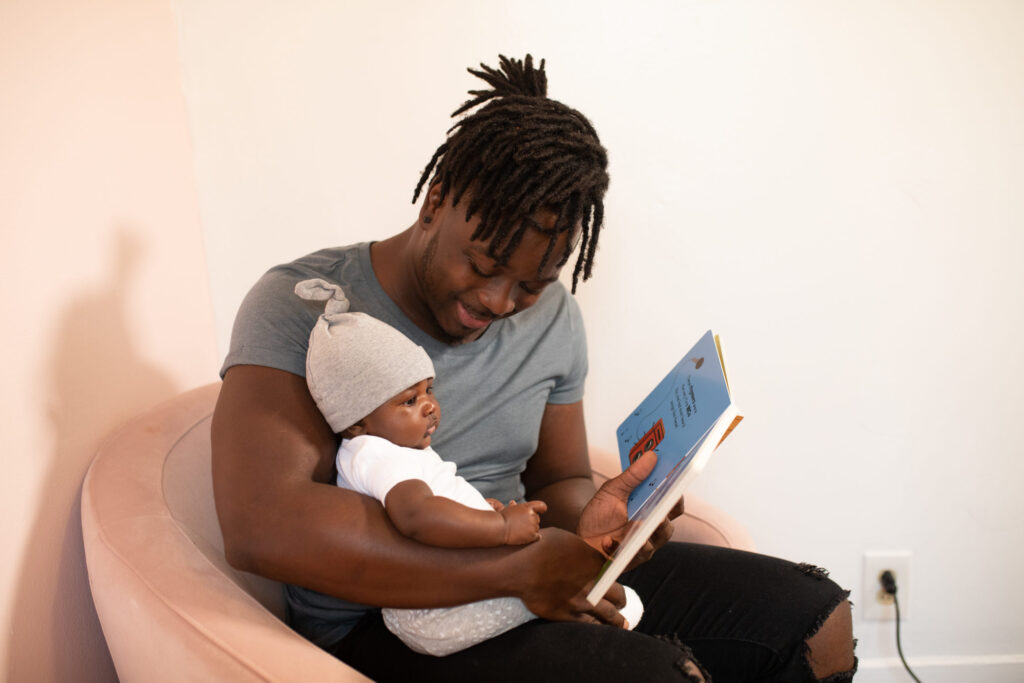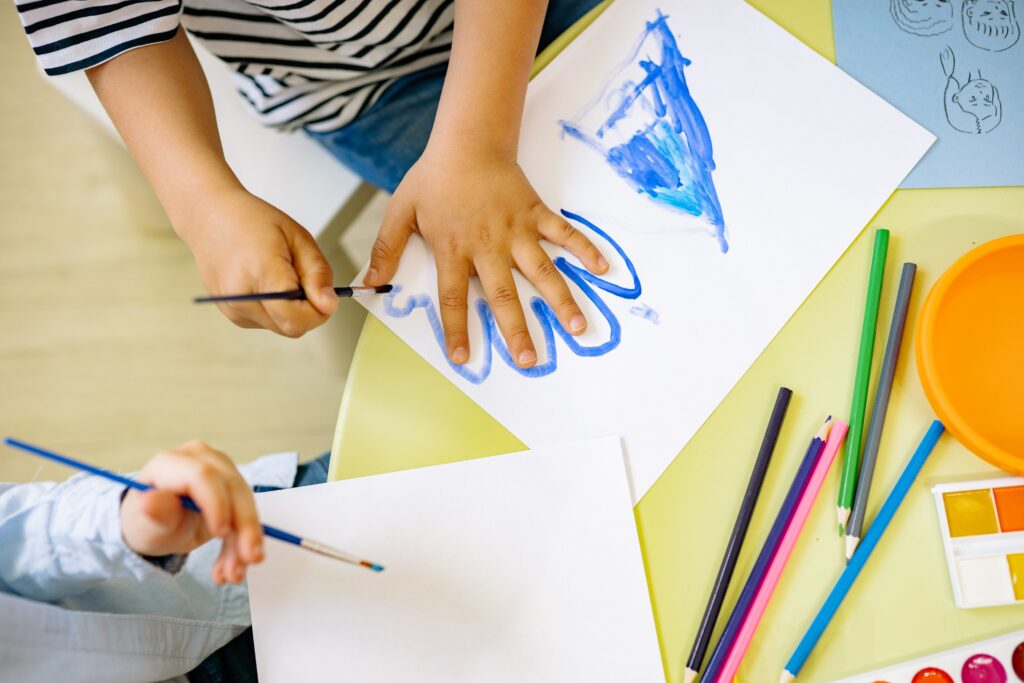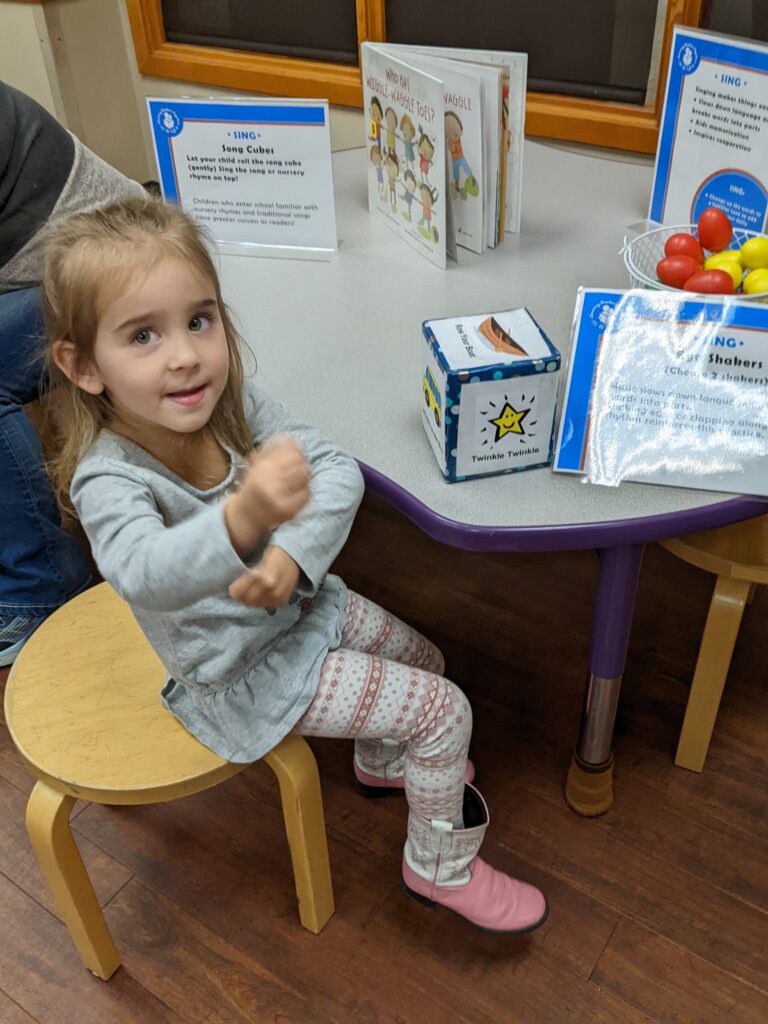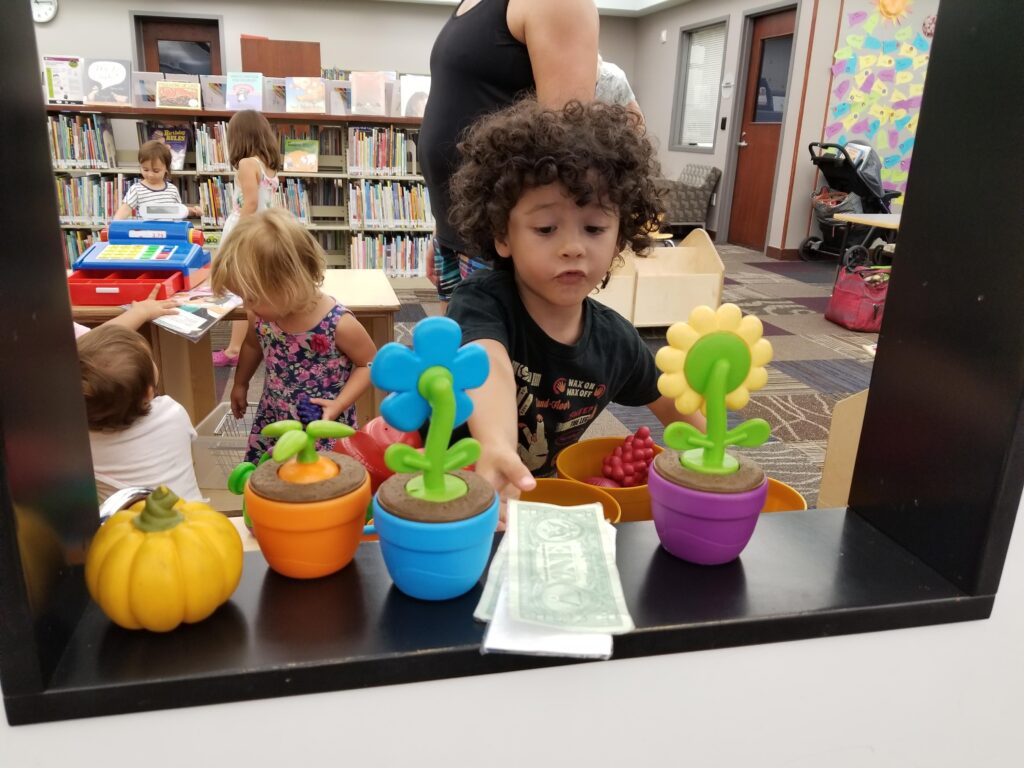The five early literacy practices start with what parents and caregivers are already doing with their children. Using the information from the six early literacy skills, the focus of the teaching is to emphasize to parents and caregivers how to maximize those practices for early literacy development. The five early literacy practices are: sing, talk, read, write, and play.
READ
Shared reading is the best way to help children get ready to read. Reading together and talking about what you read helps children increase their vocabulary and background knowledge, learn how books work, but also helps children develop a love of reading.
Reading aloud to children helps with:
Print Motivation
The more fun a child has reading books, the more likely he will become an independent reader. Read all types of books that a child might enjoy, including pop-ups, wordless books, fiction, and non-fiction. Children are more likely to engage with reading if they are able to see themselves, including their race and culture, reflected in books.
Print Awareness
Children who spend time with books gradually learn the mechanics of books (how books are orientated, how to turn pages, text direction) that will allow them to jump right into reading when they are in school.
Letter Knowledge
Learning letter names, shapes, and sounds is a building block to being able to sound out words on a page. Reading books and looking at letters throughout is a great way to help children make the connection between letters and words.
Vocabulary
Picture book texts have a higher incidence of rare and less common words than typical conversations. Multiple readings of picture books provide children with repeated exposure to new words. Providing short definitions can help children expand their vocabulary.
Phonological Awareness
Language games such as rhyming, tongue twisters, and playing with syllables help children begin to learn phonological awareness. Rhyming books, books that incorporate songs, and nursery rhymes all help build these skills.
Narrative Skills
Conversation before, during, and after stories, retelling, and asking children open-ended questions all help children think about the story they just read and learn sequencing, which all help build comprehension skills.
WRITE
Both reading and writing are ways to represent spoken words and to tell stories or communicate. When children are given a chance to explore making marks, scribbling, drawing pictures, and telling stories, they are practicing reading skills.
Scribbling, drawing, and telling stories helps with:
Print Motivation
When children have a chance to do their own writing, they have a chance to feel connected to print in a different way than when they are listening to a story. Being an active participant in writing helps keep children excited about reading stories.
Print Awareness
Drawing pictures and attempting to write letters and words help a child develop print awareness. When children do this, they have made the leap to understanding that marks on a page can carry meaning.
Letter Knowledge
Allowing children to practice making lines, curves, and circles will later inspire them to write letters on purpose. Children sometimes will make marks or a scribble, look at it, and then identify letters that they see. “Look, I made a T!”
Vocabulary
Caregivers can prompt discussions by modeling writing for their children, and then discussing what they are writing and why. Talking about grocery lists, emails, or to-do lists provides opportunities to increase a child’s vocabulary while also encouraging writing.
Phonological Awareness
Preschool aged children often begin to make intentional marks on paper and write “messages” using “inventive spelling.” They are thinking very carefully about the sounds that they hear and the letters that they know and putting them into their writing.
Narrative Skills
Some of the first stages of writing involve drawing pictures and then telling stories about what the pictures represent. Encourage a child’s narrative skills by saying, “Tell me about this picture!” or “What’s happening in this picture?”
TALK
Children learn language and other early literacy skills by listening to adults talk. As children listen to spoken language, they learn new words and what they mean while gaining important general knowledge about the world around them. This knowledge will help children understand the meaning of what they read.
Talking to children helps with:
Print Motivation
When someone asks a child questions about the stories they read together, the more easily that child can make connections between the books and his/her own life. This gets children excited to read more books.
Print Awareness
Talking about print that is all around helps children learn that print has meaning. The print can be in books, on signs, or anywhere else in the environment. By helping a child notice the print and subsequently talking about the print together help a child get ready to read.
Letter Knowledge
Children need to know three things about letters: the names, the shape, and the sounds they make. Naming letters on signs, pointing out letter shapes in sidewalk cracks or buildings, and voicing letter sounds while interacting are all ways to make these connections.
Vocabulary
The more words children hear in conversations during their early childhoods, the larger their vocabulary will be when they go to school. That big vocabulary helps children recognize words when they see them for the first time in print. If a different language is spoken at home, having a robust vocabulary in that language helps children learn English later in life.
Phonological Awareness
Phonological Awareness
When parents slow down their speech, like in “parentese,” it stretches out the words and helps children learn the individual sounds that make up words. Playing rhyming and letter sound games can help children learn these structural sounds as well.
Narrative Skills
When children listen to stories orally, they learn the structure of a story. This helps them begin to tell their own stories. Listening to adults talk about their lives also helps children build background knowledge, which they can use later to help them comprehend new ideas.
SING
Songs help children develop listening skills and pay attention to rhymes and rhythms. Singing also slows down language so children can hear the different sounds that make up words. This helps children when they begin to read.
It is important to be aware that some popular folk songs have a racist past. Even when we change the lyrics, the tune is recognizable and cannot be “unheard” by those who know the original, problematic lyrics. Much has been written on the topic lately, and The American Kodaly Institute keeps an updated list of questionable songs here.
Singing with children helps with:
Print Motivation
Children love singing. A great option to encourage not only reading, but also singing, is to read books that can be sung. These can include nursery rhymes, books that promote singing, or books that can be sung to a specific tune.
Print Awareness
A foundational early literacy skill is understanding that print has meaning. To help children make this connection, print out lyrics to favorite songs or read books that can be sung.
Letter Knowledge
Letter knowledge is, at base, a shape recognition skill, so any rhyme or song that talks about how things are the same and different can help build skills children will need to identify letters. Of course, the ABC Song helps them learn letter names and alphabetical order!
Vocabulary
Just like books, songs have great vocabulary words, such as “tuffet” or “In a cavern, in a canyon.” Hearing new words in context helps children build their vocabularies. In addition, songs work as memory aids.
Phonological Awareness
Listening to and singing songs is one of the best ways for children to build their phonological awareness because often each syllable of a word connects to a note. In addition, many songs and rhymes have rhyming words. Both pieces help children hear the individual parts of each word.
Narrative Skills
Many Mother Goose and other childhood songs are little stories, and listening to them helps children learn about story structure and sequencing. Even short songs like “The Itsy Bitsy Spider” have a beginning, a problem in the middle, and a resolution at the end. When children sing these songs, they become storytellers.
PLAY
Through play, especially pretend and dramatic play, children learn about language. When children pretend, they’re thinking symbolically, which helps them to understand that spoken and written words can stand for real objects and experiences. Play also helps children to express themselves and put thoughts into words and practice narrative skills like sequencing.
Playing with children helps with:
Print Motivation
Exposing children to many genres and topics can get your child excited about books and build background knowledge for playtime. Parents can also follow their child’s interest by bringing home books about topics their child is interested in and likes to act out.
Print Awareness
Play time can be an opportunity to show children that print is used in a wide variety of ways. Drivers use maps, chefs use recipes, shoppers use lists. The more children see writing in their play props, the more they learn that print is something that is all around them.
Letter Knowledge
Children learn through all of their senses, so exploration of shapes and letter forms via puzzles, play dough, sensory tables, and body movements all help children build their letter knowledge. Sorting games and matching activities directly involve shape recognition and prepare children to recognize small differences in letters.
Vocabulary
As children play, they often discuss their scenarios, actions and props. “This stick is the magic wand and I’m going to turn you into a butterfly.” This gives them a chance to practice new vocabulary. They also learn new words when an adult introduces new ideas. “What would you like for dessert? Would you like cake or a sundae? A sundae is ice cream in a bowl with chocolate sauce and sprinkles on top.”
Phonological Awareness
Singing isn’t the only way to build phonological awareness skills; chanting games (“Who Stole the Cookies from the Cookie Jar?”), clapping games (“Miss Mary Mack,”), and rhyming games (“Down By the Bay,”) all contribute to this as well, by highlighting the rhythms and sounds of oral language, and involving the whole body.
Narrative Skills
When children act out stories they know, either as a play or with props or puppets, they practice sequencing events. They also are exploring and investigating story structure. Oral language is the critical component that helps build narrative skills. This includes talking about their play, describing what they are doing, negotiating roles, and discussing props.
More Resources






